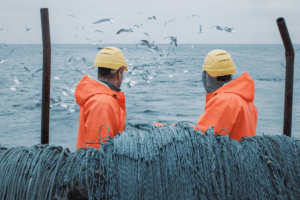Maritime workers who set out to sea on fishing trawlers perform the most dangerous jobs in America, according to the U.S. Bureau of Labor Statistics. Seamen must live and work in cramped vessels which are crammed with tools, nets, and heavy equipment, including trawl winches. Per the Centers for Disease Control (CDC), between 2000 and 2011, there were 8 fatal and 27 non-fatal injuries among commercial fishing trawlers involving deck winches in a Gulf of Mexico fishing fleet. Many of these accidents were caused by negligence, poor maintenance of vessels or winch equipment, and errors by other crew members.

Trawl Winch Accidents
Trawl winches come in various models and sizes and are commonly used on purse seiners and other trawlers. They use different power sources, but the most common is hydraulic power. Trawl winches are heavy pieces of deck machinery, weighing between 6 to 120 tons, depending on the type and manufacturer. Some are remotely operated to free the operator to work directly with the load.
Because trawl winches are constantly in motion and fishing trawlers are often buffeted by wind and waves, they are dangerous to work around. Winches are used to let out or reel in heavy rope or steel cables to adjust the tension or change the distance of fishing nets or lines from the trawlers. It is easy, especially in cases where a remote winch is being used, for a crew member to get caught by the rope, cable, nets, handling pots, or even the machinery. Loose articles of clothing, including shorts, gloves, or long sleeves tend to get snagged on winches. According to the CDC, the most serious injuries, including fatal ones, involve entanglements with the spinning winch drum.
Trawl Winch Injuries
Per the CDC, the most common injuries caused by trawl winch accidents include:
- Amputations of fingers, hands, and arms
- Fractures
- Injuries involving multiple body parts
- Mechanical asphyxiation
The CDC notes that in the cases where mechanical asphyxiation were cited as a cause of death, the two seamen had been working on the ship alone.
In many cases, accidents involving trawl winches are caused by poor maintenance or operator mistakes that could have been avoided. Making sure that seamen work in a safe environment is an employer’s primary obligation under the Jones Act. If an employer fails to keep a vessel and its equipment in a state of good repair or allows lax enforcement of safety rules, the employer may be liable for any injuries or death caused by an accident aboard the vessel.
Benefits from trawl winch injuries can be obtained by the Jones Act as well as a negligence claim. In addition, if your loved one died as result of a trawl winch injury, you have the legal right to file a wrongful death maritime lawsuit, which covers not only the Jones Act, but the Death on High Seas Act (if applicable) and the Longshore Harbor Workers’ Compensation Act. For for in-depth resources on maritime wrongful death claims, see our article, Maritime Wrongful Death Lawsuits.